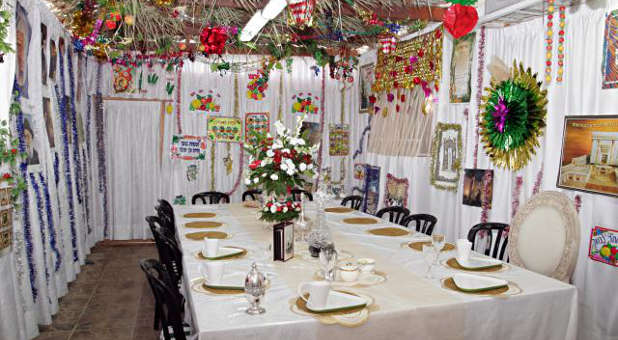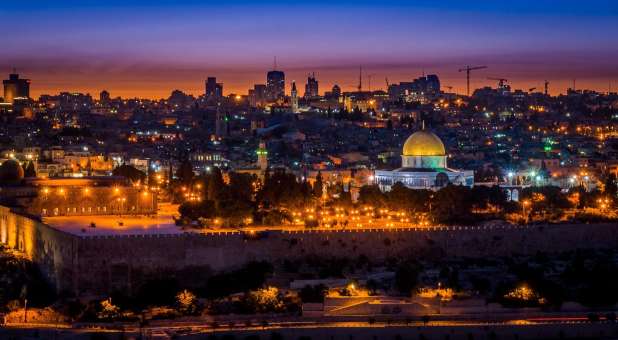Every year, throngs of Christians from all over the world flood the streets of Jerusalem in October, waving flags of Israel and the nations from which they come. It is a beautiful expression of solidarity for Israel and love for the Jewish people.
Many of these Christians are inspired by biblical prophecy. According to Zechariah, “Then it will be that all the nations who have come against Jerusalem and survived will go up each year to worship the King, the Lord of Hosts, and to celebrate the Feast of Tabernacles” (Zech. 14:16, MEV).
But what is the Feast of Tabernacles?
The Feast of Tabernacles, also called the Feast of Booths in some translations, is one of the biblical holidays described in Leviticus 23. Jewish people do not typically refer to it as “the Feast of Tabernacles” (or “Booths”) but more commonly refer to it by its Hebrew name: Sukkot, which this year falls on Monday, October 17.
What is a Sukkah?
“Tabernacles” and “booths” are attempts to translate sukkot into English. The singular form is sukkah.
A sukkah is a makeshift shade from the sun made from readily available materials. For example, during the harvest season of late summer, a laborer might rise early and work throughout the morning. Then as the oppressive midday sun bears down, he takes a break. Using leftover plant stalks, leaves, and branches, he constructs a simple shelter to provide him with shade.
When traveling through Israel’s countryside during the harvest season in biblical times, one would no doubt have seen many of these little shelters in fields, vineyards and orchards. But they are not just for harvest. Jonah also built such a sukkah to sit in as he waited to see what would come of Nineveh (Jon. 4:5). Jacob built sukkot for his cattle in his journeys, and actually named the place after them (Gen. 33:17).
When the ancient Israelites emerged from Egypt, they left their houses behind. At first, they would not even have had tents to pitch to protect themselves. They would have gathered whatever brush they could find to keep the sun off their heads. God Himself also sheltered them from the sun’s rays; His presence was the sukkah they needed!
Because of its uses, the sukkah is a symbol for both harvest and sojourning.
The Biblical Source
Given this information, let’s take a look at the institution of this holiday in the Bible:
“Speak to the children of Israel, saying: The fifteenth day of this seventh month shall be the Feast of Tabernacles [Sukkot] for seven days to the Lord” (Lev. 23:34, MEV).
“On the fifteenth day of the seventh month, when you have gathered in the produce of the land, you shall keep a feast to the Lord for seven days. On the first day shall be a sabbath, and on the eighth day shall be a sabbath. You shall take on the first day the branches of majestic trees—branches of palm trees, branches of leafy trees, and willows from a brook, and you shall rejoice before the Lord your God for seven days. You shall keep it as a feast to the Lord for seven days in the year. It shall be a perpetual statute in your generations. You shall celebrate it in the seventh month. You shall dwell in booths for seven days. All who are native children of Israel shall dwell in booths, that your generations may know that I made the children of Israel dwell in booths when I brought them out of the land of Egypt: I am the Lord your God“ (Lev. 23:39-43, MEV).
To summarize this passage:
- Sukkot is a happy seven-day holiday.
- It starts on the 15th day of the seventh month.
- It is connected to the harvest.
- The first and eighth days are days of rest.
- One should rejoice using four kinds of plants.
- It is an everlasting commandment.
- Jewish people in Israel are commanded to dwell in a sukkah for seven days.
- It is a commemoration of the exodus from Egypt.
Happy Campers
Today Jewish people all over the world, not just in Israel, construct sukkot to celebrate this joyous festival. Usually this takes the form of a small hut with natural plant material, such as branches or bamboo. Then decorations and furnishings are added to make it feel festive and comfortable. Depending on the weather and climate, one might eat meals or even sleep in the sukkah each night.
The four plants mentioned in the verse (identified as a citron fruit, palm branch, myrtle branches, and willow branches) are bound together. Each day, participants shake them in each direction as an expression of prayer and worship.
On the seventh day, called Hoshana Rabba, there are prayers for rain. In ancient times, these prayers accompanied a ceremony in which water from the pool of Siloam was poured on the Temple altar.
In the gospel of John, Jesus taught in the Temple during Sukkot (John 7:2–14). It was on the seventh day, Hoshana Rabba, when He said, “If anyone is thirsty, let him come to Me and drink. He who believes in Me, as the Scripture has said, out of his heart shall flow rivers of living water” (John 7:37-38, MEV).
Sukkot in the Future
Sukkot may contain symbols of the past, but it is a future-focused holiday. It occurs at the very culmination of the calendar: after the harvest, in the seventh month, on the 15th day (the full moon), and lasting for seven days. It depicts the messianic future of peace and God’s provision.
As the prophet Zechariah declared, one day all nations will flow to Jerusalem for the festival. So why not start now? {eoa}
Aaron Eby is a writer, teacher, and translator for the Messianic ministry of First Fruits of Zion (www.ffoz.org), an international organization with offices in Israel, Canada, and USA, bringing Messianic Jewish teaching to Christians and Jews. Aaron is also a member of the Board of Directors for The Bram Center for Messianic Jewish Learning in Jerusalem (thebramcenter.org).
See an error in this article?
To contact us or to submit an article






















